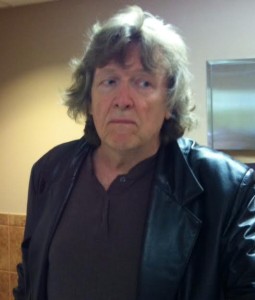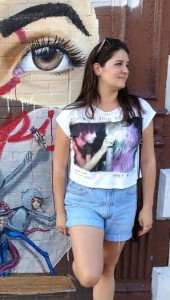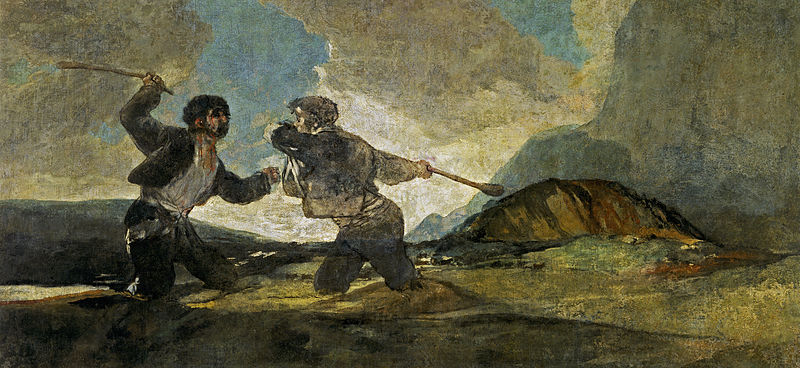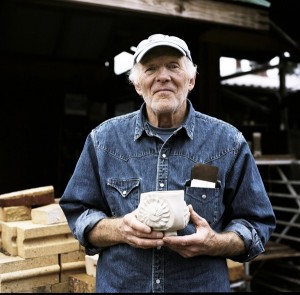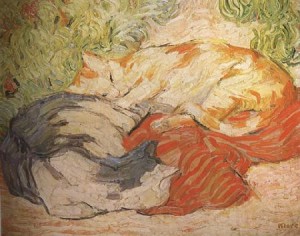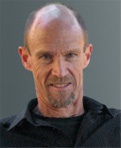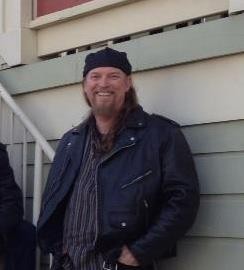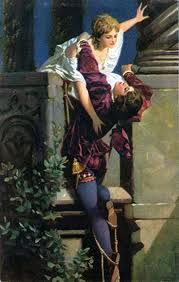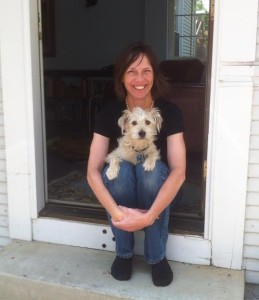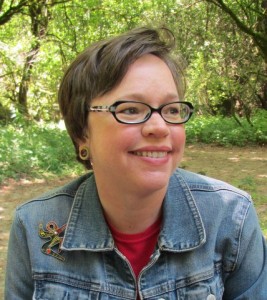Starlight Taxi: A Glimpse Into Roy Bentley’s Appalachian Soul
by Stephanie Stanley
“This place is there for those who know where to look
and why that shiver up the spine isn’t about wind
or reminders that we die but what it takes to live
where all the talk is an inventory of close escapes.”
~ From “Elegy, Neon Junction”, Starlight Taxi (Section One), by Roy Bentley
In Roy Bentley’s latest collection of poems, Starlight Taxi, death and resurrection, labor and leisure, love and betrayal, God and sin, the famed and family collide, give the reader a 95-page glimpse into Bentley’s Appalachian soul.
Growing up in the late 1950s, Bentley fondly recalls “idyllic” memories, kindness and a level of parental acceptance that drove him to achieve his dreams later in life.
“My parents came to Ohio after leaving Kentucky, so I spent the first twelve years of my precocious childhood playing in orchards and getting in touch with kindness. It was truly an idyllic time for me,” said Bentley. “I was an only child and my parents were starting to have some problems, but they treated me with respect and awe. The level of acceptance I got during the first seven years of my life pushed me to later believe I could do something as remarkable as become a writer. It is tough work, but it requires confidence and the belief that I have something to say.”
Bentley began writing in 1969, though he says he “floundered around” with the craft until attending Ohio University in 1976. In 1984, his first chapbook was published and he was awarded the Signpost Poetry Award by the Bellingham Review, in Bellingham, Washington. For the past 30 years, he has continued to publish books and chapbooks of poems.
According to Bentley, his favorite work to date—Starlight Taxi—took ten years to complete.
“Poetry collections gestate so long in different versions,” said Bentley. “Starlight Taxi was rewritten, went through several title changes, and was a finalist in several contests before winning the Blue Lynx Prize in 2012.”
Bentley says many of the poems contained in the collection are “largely autobiographical.”
“While some members of my family remember some of the instances and details differently, autobiography enters into most of the work I do, especially stories and narratives,” said Bentley. “My writing is usually grounded in somewhere I have been or something that I’ve done. My life is rooted right in there.”
“The two of us, mother and son, are happy. You
could do worse than to be born in Dayton, Ohio;
you could do worse than Nettie Potter for a mother,
the blue of her dress storming over shoulders.
She’s bought a thing which the weight of the light
causes to alternately glow and darken. She’s played
music as cheerful as she wishes the world to be.”
~ From “Listening to Coltrane on the 4th of July: 1. Earth Angel”, Starlight Taxi (Section Two)
Starlight Taxi is divided into four sections, each varying in subject matter and vivid imagery. Bentley says the order of the poems “evolved” over time.
“I tried an arrangement where my Appalachian themed poems were in the back of the book, but I found out through the course of submitting the collection to contests, the section the editors felt the strongest about was the Appalachian section, so I put it first and cut a few weaker sections,” said Bentley. “I knew from having won an Ohio Arts Council Award that my poem “Listening to Coltrane on the 4th of July” was strong by itself, so I put it in its own section. I am always half scared when I write that critics are going to tear into my work for little things like similarities—like you’re doing the same poem over and over. I’m careful to vary subjects and approach, and I try not to be too damn repetitive.”
Bentley says the poems he included in Starlight Taxi are written about people and the places he describes are “peopled landscapes”.
“I just never seem to have the focus other writers might, where they use the landscape and draw from it. To me, the landscape is a peopled landscape. My poems are about people. I never try to manipulate the reader with imagery, but I realize that there are certain images and a way to present the images,” said Bentley. “The reader needs to know where they are while reading a poem. I look at a poem much like a screenplay with a setting. Something has to happen. I kind of want my work to be like an intellectual, smart comic book. I love movies, and I like for my poems to be visual and for the reader to have a cinema-like experience.”
“When I wasn’t sleeping myself, I was at the movies.
Brando’s line of dialogue from The Fugitive Kind
likely never entered his dreams: We’re, all of us,
sentenced to solitary confinement inside our
lovely skins. We saw one another on weekends.
He’d fire up the grill, singe a couple of steaks.
There’s a closeness engendered by factory work,
by being part of any suffering which has its own
untransmutable satisfactions.”
~ From “Factory Work,” Starlight Taxi (Section Three)
After completing his book The Trouble With a Short Horse in Montana Bentley says he felt like he was “coming into his own as a writer”. Before long, the collection would be overshadowed by his latest work, “Starlight Taxi”. Bentley says each collection reflects a distinct stage in his life.
“It is a mystery to me how a person changes over the course of a long life. I’m fortunate that I’ve lived long enough to see and express different parts of my life,” said Bentley. “I can’t believe how much fighting and denial a person has to go through to handle their life. The loss of my parents pushed me to write about them in poems, because I think people live again when you write about them, in a way that is unexpected and cool.”
“If the living are with us, some almost real, so are the dead
who settle for being welcome in the room where pictures
are snapped and flashbulb circles dot a line of sight and
a gift of cowboy boots or pearls or a tool is everything.”
~ From “Christmas, the Late Fifties,” Starlight Taxi (Section Four)
Lee Martin, author of The Bright Forever, describes Bentley’s poems as “stories of work and family and the mercy we need and deserve in the midst of our hard times.” While Bentley agrees with Martin’s evaluation, he feels his work juggles the past and present in an effort to come to terms with sixty years of living.
“If I could stand outer-body from myself and my work, I would say that this is a guy who is, clearly, interested in the question of what it means to be here, now,” said Bentley. “There’s a lot of history tied up in my work. I would say that I’m a guy who wrestles with things. I don’t just deal with subjects, I wrestle subjects. In the Bible, Daniel wrestles an angel until the angel blesses him. I feel that way. That’s poetry for me.”
Throughout his life, three experiences have remained at the heart of Roy Bentley and have lingered in the shadows of each poem that flowed from the fingers of the Appalachian poet.
“Beyond that, I would say serving in the Air Force definitely shaped me. I got into school at OU on the G.I. bill. In the process, I got a sense of what’s too much, how to ‘show, not tell’ in a piece, how to make poems powerful, more condensed, and how to use compression to my advantage,” said Bentley. “Most of all, I would say I have been shaped by my Grandma Potter reading to me from the King James Bible. Her voice, that voice, is in my work. That is where it all began.”
In recent times, Bentley has felt the pull of his Appalachian roots, guiding him back to the people and the places that played a vital role in the shaping of the man and, in turn, the poet.
“Like my parents, I kind of pulled away from my history for a while, because I think there’s a certain prejudice to being Appalachian, but lately I have begun to embrace it,” said Bentley. “Some might call my writing ‘hillbilly lit’ and mock it, saying it is about the icky part of Appalachia. To me, being Appalachian is no different than any other culture trying to wrestle with their identity. Why wouldn’t you deal with it? Why wouldn’t you want to come to terms with what makes you you?”
Q&A Session with Roy Bentley:
Stephanie Stanley: What inspires you to write?
Roy Bentley: “Everything is interesting to me. I was watching a show on PBS the other night about John Barrymore, and the actor said the word ‘stagger’. That set my mind off to start a poem called ‘Stagger’, about my father dealing with a visit from his father. There’s nothing that doesn’t interest me as far as subjects go. I don’t try to be confessional in my writing. I’m not trying to write a poem to tell on someone, but I will tell on myself, and I find that to be important. I am open to the flow of ideas and experience. I don’t think I have an agenda as a writer, and I think that helps me. I don’t always have to feel deeply about what I’m writing about at the start, but over the course of writing it, I begin to feel it deeply. A lot of writers need to be inspired and they write a lot less frequently than I do. I think I use writing to hide out from the world.”
SS: Religious themes abound in Starlight Taxi. What role did or does religion play in your life?
RB: “I consider myself spiritual, but I’m not religious. The question of God, faith and trying to wrestle with these things comes up in my work. I believe that if you’re here and awake, you’ll ask yourself if there’s a God and what it all means.”
SS: Why did you choose the title, “Starlight Taxi”?
RB: “My poem, ‘Starlight Taxi’, is about the death of my father and the light in his eyes when I was in the room. I was the only one in the room when my father died of lung cancer, and I was just there with him, trying to deal with it. When he passed, his eyes did not close, and the light in his eyes was the focus of that metaphor. We taxi the light around. Originally, I was going to title the book ‘Listening to Coltrane on the 4th of July’, but when it won the Blue Lynx Prize, it won under the title ‘Starlight Taxi’, and I’ve never been sorry about the title change, as that is the unified image that best embodies what is going on in the book.”
SS: How much weight do you place on the opinions of editors and critics?
RB: “I just can’t trust myself. I’m clueless, I worry sometimes, and I need lots of guidance. For example, ‘Starlight Taxi’ and my other book are both over 90 pages long, though my newer books are substantially shorter. Length worries me. If you publish a poetry collection over 68-70 pages, I think you’re asking a lot of the reader. Even though Starlight Taxi took ten years to write, because of the length of it, I fear the reader won’t want to give it a week to read it. I’m trying to keep my next few books around 70 pages in length. The reader has to be the primary consideration when writing. Poets have to be humble enough to listen to an editor who knows what they are talking about. They are not trying to hurt your feelings. They are trying to help to make your piece the best that it can possibly be.”
SS: What are your thoughts about modern poetry and modern poets?
RB: “I read a lot of younger writers on Poetry Daily or Poets.org. While some of their work may not be to my liking, a lot of the young readers I’ve been reading have a story to tell. Just because they are young doesn’t mean they lack skill or experience. They have both, and I don’t know where they got it. I started out writing when I was 16, but wasn’t relatively decent at it until around 1980. There’s a lot of work online, and I think they publish too many and too soon. I think at times modern writers are impatient to publish, and that is a mistake. What’s the hurry? It is difficult to know when a poem is done. Take your damn time. Really.”
SS: What is your current writing project?
RB: “I think I’m always somewhat in love with the latest stuff I’m working on. I have a book called ‘Sass’ that is all-Appalachian in theme. ‘Sass’ pulls together story and extended narrative with characters and is set in Kentucky. It has taken a year to complete. I had poems about Kentucky to include in the book, but had to fill in a few holes and spaces to keep the narrative going. It isn’t published yet, but I’m pretty enamored of it.”
Stephanie Stanley, of Chillicothe,Ohio, is a freelance writer and photographer for the Chillicothe Gazette and the Pike County News Watchman, where she writes weekly feature stories, business features and artist profiles. In addition to the Gazette and News Watchman, Stanley’s feature articles have appeared in various publications, including The Marion Star, Newark Advocate, The News-Messenger, Coshocton Tribune, Lancaster Eagle Gazette, Jackson County Times Journal, Circleville Herald, and WOUB Public Media. In February 2012, Stanley’s feature story, “The Devil in the Details”, was awarded a First Place Best Feature Osman Hooper Award by the Ohio Newspaper Association. Earlier this month, Stanley’s feature, “Singing Her Heart Out”, was named First Place Best Feature at the Ohio Newspaper Association Convention, in Columbus, and “The Simpler Life”, a series of feature stories about Mennonites in Pike County, earned Third Place Best Feature. When she isn’t writing, Stanley works as a private music instructor and is active in the local arts community.

